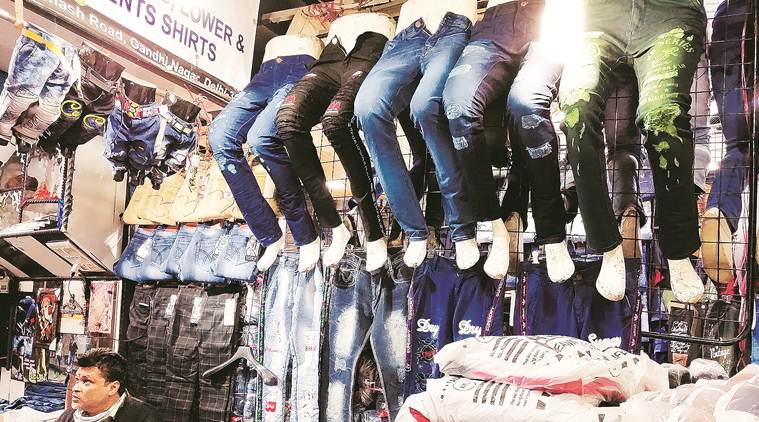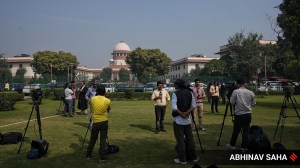- India
- International
Jeans editing
Driving in tight denims over 235 km recently put a life in danger. But at this market, serving customers from Kashmir to Kanyakumari, that look is to die for
 “Narrow fit”, “faded” and “distressed” jeans are the highest-selling items. Koel Banerjee
“Narrow fit”, “faded” and “distressed” jeans are the highest-selling items. Koel Banerjee
AT ONE of Asia’s largest wholesale readymade garments’ markets, in East Delhi’s Gandhi Nagar, there is little surprise over a medical emergency caused by a piece of clothing. Last month, a man driving from Delhi to Rishikesh, a distance of over 235 km, wearing tight jeans had to be hospitalised following a pulmonary embolism (a clot in the lungs) suspected to have been caused by his sartorial choice.
“People buy tight-fitting jeans from us, and further narrow them down using their local tailors,” says a wholesale shop employee who does not want to be named.
Attending to customers at a shop owned by his father Rakesh Aggarwal, Shubham, 21, puts “narrow fit”, “faded” and “distressed” jeans as one of their highest-selling items.
Chips in Aggarwal, “We offer products to shopkeepers at all kinds of budgets. The limit is sky-high.”
Praveen Gupta, who has a shop on Subhash Road, and is vice-president of the Association of Subhash Road & Bara Bazar Wholesale Readymade Garments Market, says they supply garments to every part of the country, “from Kashmir to Kanyakumari and Rajasthan to Arunachal Pradesh”, as well as countries such as Nepal and UAE. “Imported clothes from Bangladesh, China and Thailand also come here and are sold to retail vendors.”

Ahsan Ali, 64, has been running his business since 1980, when the garment market came up, making him “one of the oldest traders here”. “I supply clothes to a Delhi exporter, who then sends them to Dubai.”
Gupta says that when the Gandhi Nagar market first opened, it had only 12 shops. Now the number is over 5,000, with residences slowly yielding space to shopkeepers. Apart from the shops, the market holds just a temple, located at its centre. Priest Mohan Shyam Sharma says, “Earlier, no one came. But the day the phenomenon of Ganeshji drinking milk happened in 1995, people turned up in hordes. There has been no dearth of devotees since.”
Recalling the exact date he landed up at the market, Gupta says, “It was May 7, 1984. I came from Panipat after my board exams, with my father Hukum Gupta, who is now the president of the traders’ organisation.”
The first link in the chain are agents who buy fabric from mills across the country, especially Ahmedabad and Bhilwara in Rajasthan, and send it to factories in Delhi for cutting. Embroidery, if needed, is done next, followed by stitching and dyeing. The garments are then ironed, packed and sent to the wholesale market. After the retail vendors select the goods, these are packed for delivery.
The dealers don’t sell item-wise, but by packets. One wholesaler may sell six pieces per packet, another 20, in all sizes. One wholesaler, who does not wish to be named, lists their prices at Rs 100 each for good quality shirts, and Rs 25 for children’s clothes.
Near the temple, Nissar Ahmad is checking out sweaters. A shopkeeper from Gangapur in Rajasthan, he is here with around Rs 15,000 to pick up some woollens for the winter.
According to a wholesaler, with a budget of Rs 15,000, a buyer can get nearly 120-125 pieces of sweaters.
It was Shubham who convinced the family to get out of its 35-year-old sanitary appliances business, and get into clothes. The Aggarwals opened their wholesale store in Gandhi Nagar nearly six years ago.
Shubham, who talks about their “fashionable” range, is assisted by Ravi Suryavanshi, 28, in handling customers. “Summer is the busiest season. Sale is low during winters and monsoons,” says Suryavanshi, who puts their daily footfall at 20-30 customers on best days. The average monthly income of a wholesaler is over Rs 10,000, and “can go up to lakhs”.
Soon, it’s lunch time and Aggarwal and son sit down to have food cooked from home.
Towards evening, Sharad Gurjar, 23, who has bought denim pants, plain trousers and T-shirts, is monitoring their packing. He arrived on a Monday, to realise that was the day the market remains shut. He spent the night at a hotel nearby, and is today headed home to his village in Madhya Pradesh. He says he will open his own shop with the goods.
Two shops away, two men are admiring a jacket hanging in a shop. Taj Khan, 33, a resident of Farrukhabad in Uttar Pradesh, is in Delhi to visit his sister. He came to the market in the hope of picking up a jacket, if the dealers agreed to selling a single piece. “I have been to this market multiple times earlier,” he says.
Nearby, Pinky Garg from Ghaziabad has just been turned away. She wanted to buy six caps, but the dealer said he would not sell less than 12 pieces, for Rs 10-12 each. “I have a small shop. My budget is less,” Garg says.
Anjali Rashtogi, 45, the rare woman at the market along with Garg, is the owner of a housekeeping agency in Noida. She hopes to purchase 150 grey sweaters for her staff.
Dealer Usha Gupta, 38, is also an exception. A mother of two, Usha, who is from Krishna Nagar, started running her shop in May. “Earlier, I used to visit occasionally. But now I handle everything,” she smiles, talking about her day beginning at 5.30 am with sending her children to school, and ending with cooking dinner for the family. Her husband runs a separate shop in the same market.
Gupta considers herself fortunate as their shop is located in a building they own, with a toilet on the top floor, admitting that public toilets are a nightmare, even for men.
“There is always a queue of nearly 15 men outside a public toilet. Sometimes, longer,” says a shopkeeper.
V-P Gupta says the toilets are just one of their concerns, the other big issue being encroachment. People keep on extending their shops illegally, thereby clogging drains and blocking roads, he says. “The road is actually 40 feet, but due to encroachment it has come down to 10 feet. If a fire breaks out here, it will be a bigger disaster than Anaj Mandi (in Delhi where 43 died). I have appealed to the municipal corporation multiple times,” he says.
By 8 pm, the market is deserted, with the owners doing the final accounts and workers packing bundles and bringing down mannequins. Priest Sharma chants the last prayers.
Over at Aggarwal’s shop, the rats that have been scurrying around are also ready for the night. The 53-year-old shrugs, “We don’t kill rats. Woh toh Ganeshji ki sawari hain (They are Lord Ganesha’s mount). We trap and release them somewhere else. They don’t damage our clothes, and if they do, that means there is a problem in the store.”
Apr 26: Latest News
- 01
- 02
- 03
- 04
- 05








































